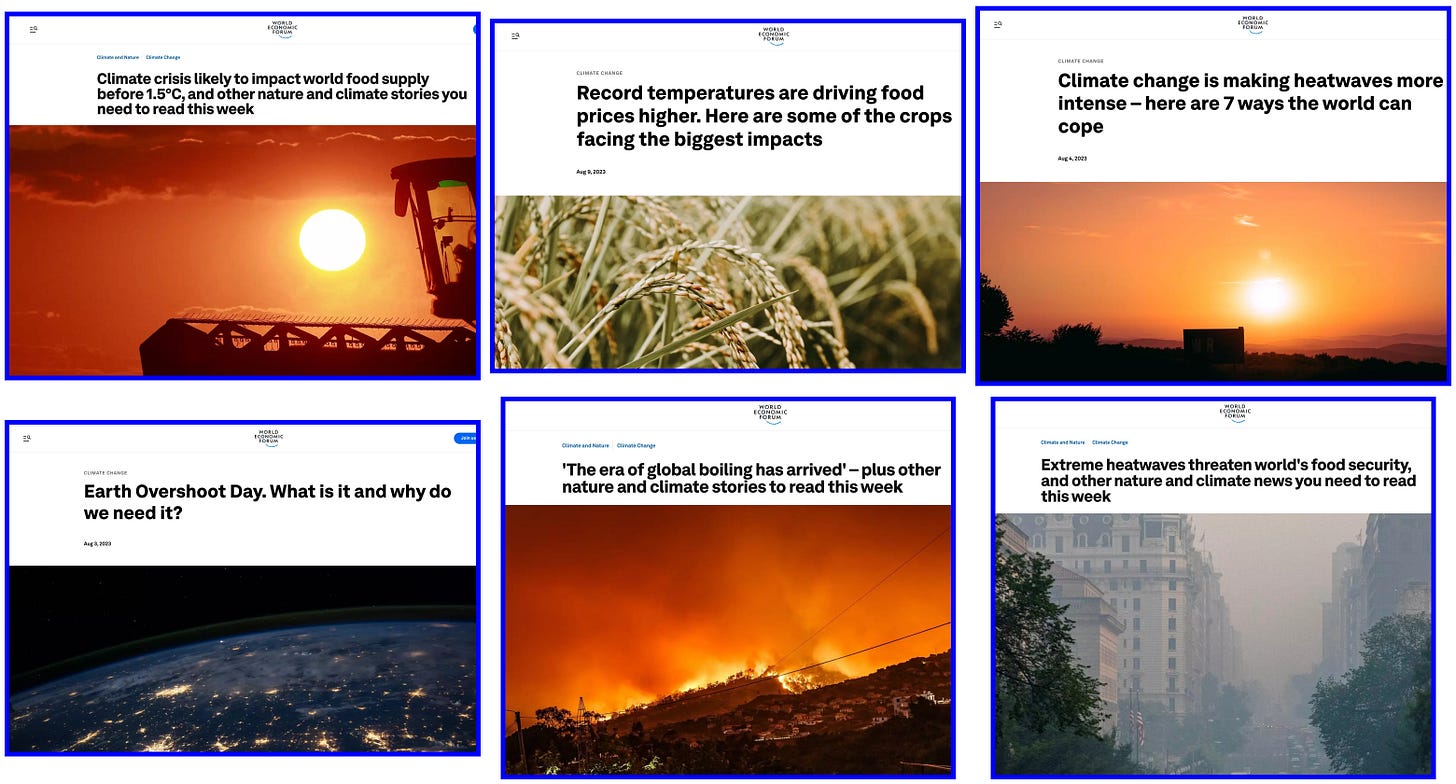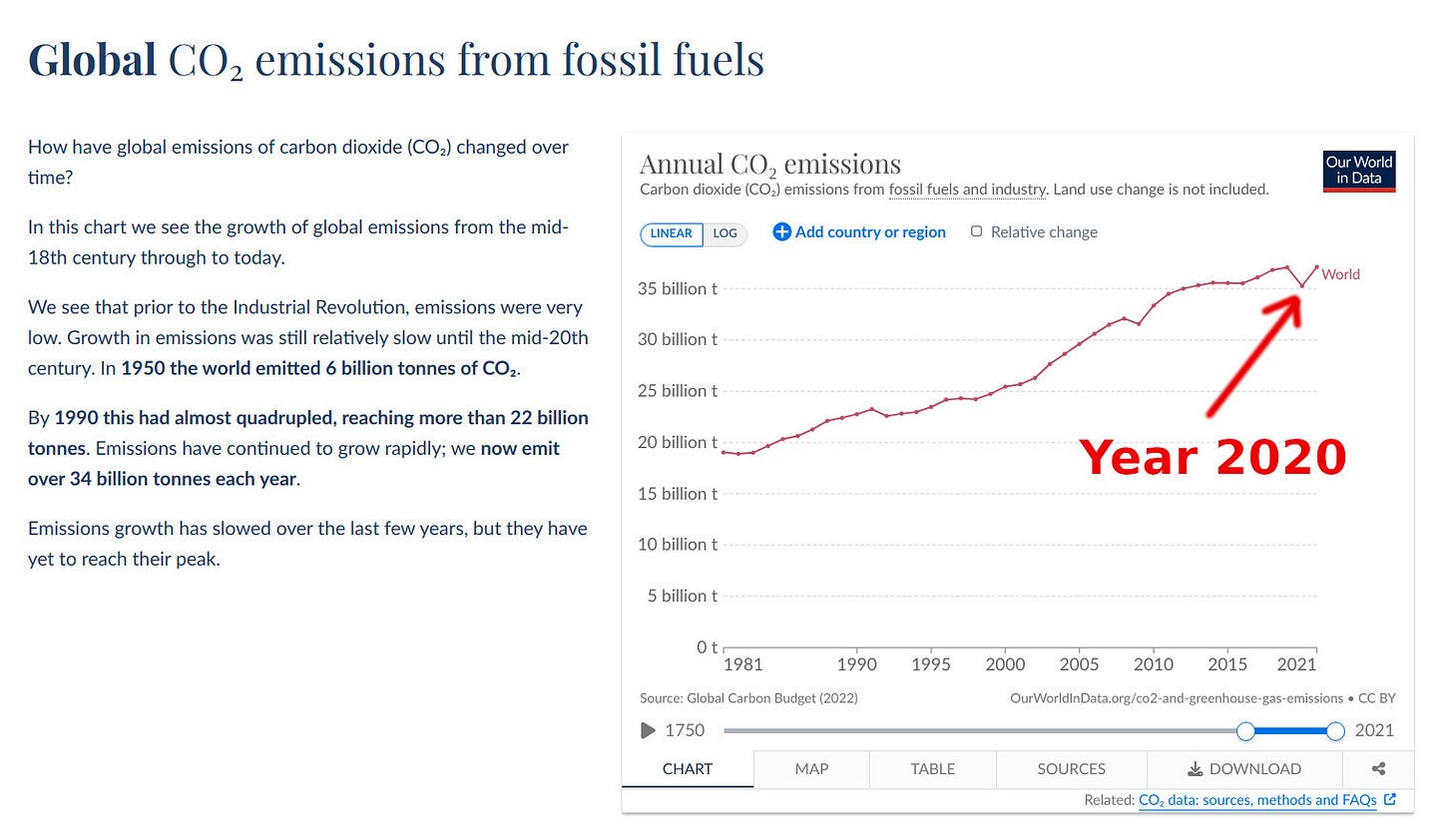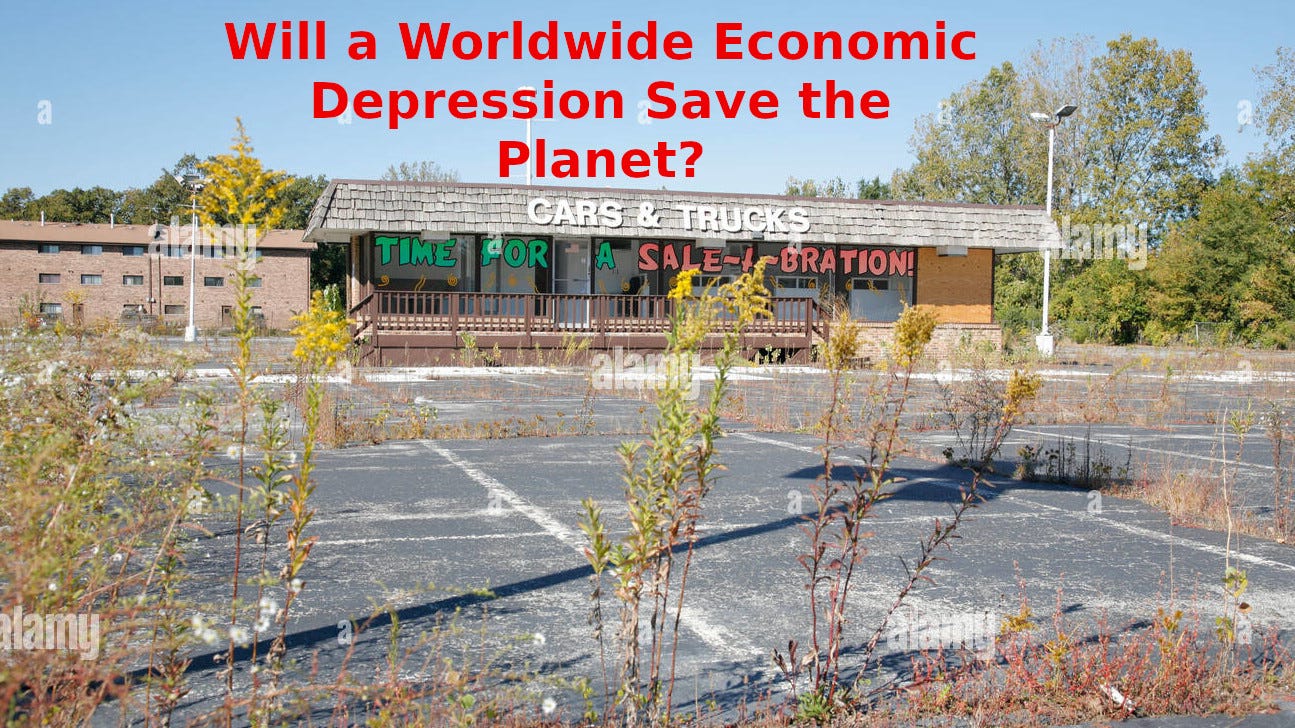Will "Climate Stakeholders" Engineer an Economic Depression to Save the Planet From Global Warming?
A deep recession is the most practical way to halve carbon emissions within a year
SUMMARY: This post will attempt to understand the thinking and motivations of the World Economic Forum and its allies. They believe in upcoming catastrophic changes in Earth’s climate. According to their data, only decisive rapid action can prevent a catastrophic discontinuous climate change.
Within their frame of reference, the only sure way to avert it is to engineer an economic depression, which could reduce CO2 emissions by up to 70% within a year. Doing so is surprisingly easy if the WEF controls several large central banks, which is indeed the case.
Will the WEF engineer a global Depression?
Dear Reader: I will explain my understanding of what drives the World Economic Forum, other “global stakeholders,” and their thinking.
This attempt to understand is not an endorsement or an attempt to justify them. I am intentionally NOT making a moral or scientific judgment here. My readers are smart enough to think and make their conclusions about climate. I hope my post will appeal to both climate change doubters and climate change believers. Both are welcome on this substack.
I am not trying to convince you that climate change is real (or is a hoax). I am trying to understand what drives people who lead the world’s decision-making - and, in this case, those who think they are our saviors and are rescuing our planet from climate change.
I am a climate skeptic who retains an open mind - but this opinion of mine has no importance for the rest of this article.
The World is On The Precipice, They Say
According to the WEF, the ongoing warming of our planet is about to unleash an irreversible series of additional climate impulses, such as
Release of vast stores of frozen (trapped in permafrost) and compressed methane (underwater clathrate gun), which would warm the planet by a few additional degrees
Burning of peat bogs that dry out would release more CO2
Change in ocean currents can trigger the so-called “Dansgaard-Oeschger event,” flipping the temperatures of the Northern Hemisphere up by several degrees
Indeed, according to the WEF climate experts, something is happening to the world in 2023 that indicates a “flipping” of the temperature this year towards a much higher temperature regime. As the chart below shows, the average surface temperature of 2023 is the highest and lies way above the historical range of temperatures seen:
If you read this and have a strong opinion about the above being true or false, be assured that your opinion is important to you and me, and you can share it in the comments - it will NOT be censored!
However, even more importantly than our opinions, the WEF believes that the above constitutes an impending catastrophe.
Nothing Works. What Else Can They Do?
The efforts to “limit emissions of CO2” made many people rich. What they have not done is reduce emissions of CO2. This chart from Our World in Data shows CO2 emissions increasing every year, except for the small dip during the year 2020, due to the COVID lockdowns:
Without getting bogged down in the details of “climate science,” let me reiterate two fundamental beliefs of the global stakeholders gathering around the WEF:
Climate change is accelerating and is reaching a tipping point
CO2 emissions, causing global warming, are not declining
Again, if you are skeptical about “climate science,” be my guest! But the above is what the WEF believes, and therefore, it is material to the choices that they could make.
Only One Way to Stop Emissions Quickly
Please note that wealthy nations produce the most CO2 emissions. Professor Sarah Harper, a WEF adviser, explains in The Telegraph’s article celebrating population collapse in the UK:
Research has found that wealthy nations tend to have much larger carbon footprints than poorer countries, as rich people can afford to buy more goods, travel more and do other activities that generate emissions.
Carbon emissions from high-income countries were 29 times larger than low-income countries on a per capita basis in 2020, World Bank figures show.
What could the WEF, along with a few leading countries, do to quickly (within a year or so) reduce CO2 emissions? Aside from the conspiratorial exotics, there is one practical policy action that can be done within a year and depress major economies’ CO2 production:
They could use several central banks to engineer an economic depression similar to the Great Depression.
The Great Depression, which saw banks fail and money supply suddenly contract, reduced GDP by 32% and increased unemployment by 25%.
A Depression Will Halve CO2 Emissions
Nobody can guess how far can a hypothetical next economic depression go. However, a recession will bring about reductions in energy use. The economy is energy. Most economic activity involves the consumption of energy and burning fuel. For example:
Construction uses energy and emits CO2 to make concrete
Driving to work uses fuel. Internal combustion cars burn hydrocarbons. Electric cars use electricity produced with hydrocarbons and paradoxically increase our carbon footprint.
All manufacturing and mining use energy.
Heating or cooling large, expensive homes and office buildings uses energy.
Therefore, a reduction in consumption and business activities means a reduction in energy use and CO2 emissions.
A part of the energy is produced using hydrocarbons (mostly coal and natural gas and fuel), and a part is produced using carbon-neutral technology such as nuclear and solar panels.
In the United States, about 39% of energy is produced using zero-carbon sources:

What would happen if energy use declined by 30% due to a recession, and the reduction was done at the expense of hydrocarbon energy?
This would reduce CO2 emissions IN HALF!
Greater declines in energy use can bring about even greater percentage declines in CO2 production. In real life, the energy mix is more complicated due to the need for “baseline generation.” Therefore, the above chart is a simplification - but it is roughly correct.
Engineering a Depression
As I just showed, CO2 emissions can be easily halved with only a 30% reduction in energy use, which would “naturally” result from a hypothetical 30% decline in GDP.
It becomes tempting, therefore, to engineer a recession. How would you do that?
Deep recessions cannot happen out of the blue for no reason. The Great Depression, which started in 1929, started for a reason. The reason was excessive borrowing and leverage. Had the United States business and consumers at the time been conservative with the use of loans and leverage, the Great Depression would not have happened, no matter what the Federal Reserve would do at the time.
The steps to make the global economy vulnerable to a sudden depression are roughly the following:
Create a reason for the sudden printing of large amounts of money. A sudden global pandemic affecting the entire world and lockdowns would do just fine to be such a reason!
Print enormous amounts of money.
Keep interest rates artificially low to encourage reckless borrowing and use of leverage.
Make the governments borrow excessive amounts of money at artificially low rates to be refinanced later.
All of the above, strangely, happened during the last three years. Was it part of a plan? We cannot be sure.
After the excessive borrowing by businesses, consumers, and the government took place, the trap was set and would spring after the interest rates increased. After interest rates increased, the business and government debt became much more expensive due to higher interest payments. Businesses will start failing, and the banks will follow. All of this is a more or less natural consequence of past money printing and debt expansion and a decrease in borrowing standards.
At this point, if several central banks, such as ECB (Europe), the Fed, and RBA (Australia), decide to let the chips fall instead of printing more money to “rescue the economy,” we will have a deep recession. Indeed, this is what they seem to be doing:
The press will probably report that nobody expected a recession to develop so rapidly and that nobody could predict it. Later, they will tell us it is good for us.
The people who believe that CO2 causes global warming and we need to reduce it at any cost should, at this point, be satisfied because a deep recession will reduce carbon emissions significantly.
Such a depression, putting a large part of the population out of work, will also make it easier to offer “Universal Basic Income,” a way to throw the planet’s population further into poverty, as this year-old post explains:
Michael Burry of ‘The Big Short’
I am not quite alone in asking whether a big depression/recession is coming.
Michael Burry, the hero of the Big Short movie, made a killing (about 100 million) in 2007-2008 by betting against subprime mortgages. After not doing much for years, he is betting almost all his capital on puts against the S&P 500 and Nasdaq. Puts benefit when the underlying stocks’ price falls.

This Substack is not a financial blog, and I do not plan to offer frequent financial commentary despite having an MBA from the University of Chicago. The world has enough financial blogs. However, this time, I could not stay silent about the possibility and signs of a “sudden” deep economic depression engineered behind the scenes to "save our planet from CO2.”
I would feel bad if it happened and I did not share my thoughts with my readers.
Also, I wanted to repeat that I am not trying to convince you whether “climate change is real” or “climate change is a hoax.” (I am a climate change skeptic who retains an open mind.) You and I can continue to believe whatever we want - I only wanted to describe the consequences of the world’s policymakers believing in climate change.
What do you think? Will a deep economic recession be “good for us”? There is plenty of room for discussion here! Any opinion is welcome.










I hereby pledge to keep my carbon emissions under that of climate guru John Kerry. I'm basically a climate hero.
I really hate when people wax poetic about the benefits of a major depression. They envision a simpler society where people bond together in the shared cause of survival. In their view, it's an agriculture-based Amish-like economy, with everyone working together in the natural world.
I live in a southeast Asian country and see the reality of this type of poverty every day. Emotionally healthy people can deal with it, yes, but people who are on the margin get pushed down and over-the-edge. It causes deep currents of dark pathological behavior, and it will take several generations for a society to recover.